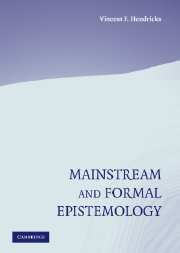4 - Counterfactual Epistemology
Published online by Cambridge University Press: 07 December 2009
Summary
In counterfactual epistemology, knowledge is characterized by tracking the truth, that is, avoiding error and gaining truth in all worlds sufficiently close to the actual world given the standard semantic interpretation of counterfactual conditionals. This conception of knowledge imposes a categorical conception of reliability able to solve the Gettier paradoxes and other severe skeptical challenges.
FORCING Knowledge is a real factual relation, subjunctively specifiable, whose structure admits our standing in this relation, tracking, to p without standing in it to some q which we know p to entail.
Robert Nozick 1981Epistemology begins with facing the beastly skepticism that arises from the possibility of an evil demon. Any talk about knowledge possession, acquisition let alone maintenance before skepticism's claim about the impossibility of knowledge is defeated, is absurd. To get epistemology off the ground it must be demonstrated that knowledge is in fact possible:
Our task here is to explain how knowledge is possible, given what the skeptic says that we do accept (for example, that it is logically possible that we are dreaming or are floating in a tank). (Nozick 1981, 355)
This is the starting point for the counterfactual epistemology developed by Dretske (1970) and later refined by Nozick (1981).
The often cited premise supporting the skeptical conclusion that agents do not know much of anything is this: If an agent cannot be guaranteed the ability to know the denials of skeptical hypotheses, then knowledge regarding other issues cannot be ascribed to the agent. The traditional understanding of infallibilism (see Chapter 2), which counts every possible world as relevant, supports this pessimistic premise.
- Type
- Chapter
- Information
- Mainstream and Formal Epistemology , pp. 50 - 61Publisher: Cambridge University PressPrint publication year: 2005



